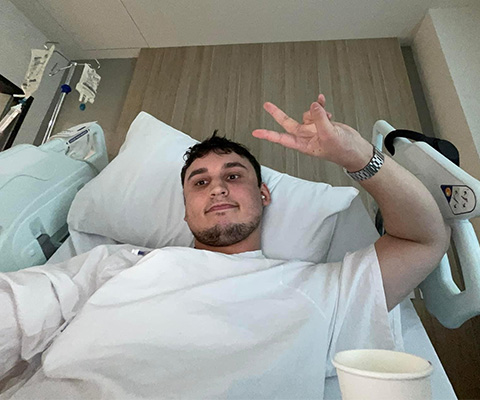I was on my own in Sydney when my cancer journey began. I moved from Christchurch in 2021 to pursue my PhD at the University of NSW. In early 2024, I began to feel tired and just thought it was PhD stress. I had also had a bit of nausea for a few months, but again, I didn’t think too much of it.
On the Thursday before Easter, I noticed a hard mass in my stomach. I thought I’d let it settle for a few days, but it didn’t go away.
I saw my doctor and told him that I had a bit of a mass. He sent me to get a computed tomography (CT) scan and then a few days later he called to say “we should have a chat” which is never what you want to hear. Neither were the following words:
“You don’t have one mass, you’ve got two. One about the size of your fist on the left-hand side of your abdomen and another the size of a grapefruit to the lower right of your belly button. What’s weird is that there is no organ there, so it makes no sense for you to have a mass there.”
We knew it was bad, we just didn’t know what it was.

I was referred to an abdominal surgeon who took out my appendix 18 months earlier. He looked at my symptoms and previous reports which showed that nothing was there at the time. So, two very large tumours had grown within 18 months.
He wasn’t sure what it was either, so I was then referred to a haematologist. A biopsy showed it was desmoplastic small blue round cell tumour (DSRCT), an incredibly rare sarcoma that affects one in every five million people - and not fun.
From diagnosis to intensive treatment
I met with Dr Jessica Ryan, Adolescent and Young Adult Oncologist at Sydney Youth Cancer Service. She was just amazing. We talked about the next steps and the following scans that came back looked pretty bad, but we were going to do our best.

I’ve had 14 rounds of chemotherapy at two-week intervals. I had a break after round seven to have a massive, 12-hour operation at Royal Prince Alfred Hospital to remove the tumours. They also had to remove some of my large intestine and other bits and pieces. It was an intensive surgery and the recovery was hard, but if it wasn’t for that, I might not be here.
Following the final seven rounds of chemotherapy, I had full abdominal radiation for 25 fractions (divided doses) which went over six weeks. It was not easy. It’s not done often at all, my radiation oncologist said the only other person he’d done full abdominal radiation for was in the 1980s! He said it would be harsh, but I’ve been really lucky with a lack of side effects. I only went into hospital once with neutropenia (low white blood cell count) but that was after my final round of chemotherapy, so it didn’t slow anything down.
We're now trying maintenance chemotherapy, which is very experimental with my cancer, but we may as well give it our best shot.
Challenges of cancer as a young adult
Being diagnosed at 25 years old was confronting and there was so much uncertainty, but I’ve never stuck my head in the sand – I want to deal with it.
It was difficult getting that diagnosis being on my own. I was the only one of my family here in Australia and I had little support at the start, but I’ve been lucky in that my mum and sister have come to New Zealand to support me and I’m living with them. I’ve also had to take leave from doing my PhD but I’m hoping to get back into things soon. It’s all been very harsh, unexpected and quite difficult.
As a young person, you have so many different plans and ambitions. I want to do this, do that, hang out with my friends, socialise… but you can’t do it. All these ideas for your future are just thrown completely into the air by a cancer diagnosis. I’d love to go travelling the world or live a year in a different country, get married, have kids in my mid-30s, all of that would be nice to do – but it might not happen. It’s incredibly hard with so much of your life left to live, hopefully.
You just don’t expect it to happen to you. Even now, using the word ‘cancer’ feels weird. I don’t know if it will ever get easier, but you come to accept it. The reality is it can be anyone.
Support from Youth Cancer Services
The Sydney Youth Cancer Service has been amazing. You can tell that the team are doing their absolute darndest to help you and they care an awful lot about what they do and the young people they are helping.
It’s been really good for me. It’s a vital service because it fills a niche for young people with cancer because your experience is much more different than an older adult or child.
A message to young people facing a rare cancer diagnosis
Remind yourself that it is tough and that it only affects a very select number of young people. What has helped me is relying on more information. Try not to worry when you don’t have enough information, because you’ll end up either worrying about it twice or you’ve worried for nothing. A lot of the time you don’t have all the information, and you will never have all the information, but when you have it – make a plan. Just keep going and that’s all you can do.
